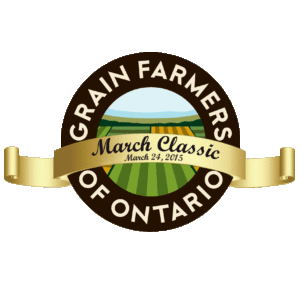
It’s amazing to me how many ways corn touches your life. Have you ever really thought about it? The way a Canadian farmer, their corn, the wheat they grow, how it touches and improves your life? Recently I had the opportunity to attend the Grain Farmers Of Ontario March Classic in London Ontario and listen to a number of very passionate, educated people speak about grains and our health.
The March Classic is the largest grain-focused conference in Eastern Canada drawing upwards of 650 attendees from farms across Ontario, government, and industry – with record attendance of 850 at the 2014 conference. The 2015 event will continue to build on the success of past conferences. Centred around the theme of ‘Ontario Grains: Growing Stronger Together’, our guest speakers provided attendees with a fresh perspective on promoting grains with consumers, the role of science within agriculture, and the influence of public perception and politics on agriculture
Th e first speaker of our day was Dr.Julie Miller Jones, a board Certified Nutrition Specialist, Certified Food Scientist, and Licensed Nutritionist, this speaker knew her stuff. She immediately charmed the crowd with her wit and candour, and spoke eloquently to the facts and myths surrounding grains. Did you know that only 4% of the population meets the recommended fibre requirement? We are not dying of wheat overdoses. In fact, eating of whole grains has decreased the risk of Type 2 Diabetes by 25%. Dr Julie Jones also quipped, people are getting fat, but “it’s not the wheat, its the calories stupid.”
e first speaker of our day was Dr.Julie Miller Jones, a board Certified Nutrition Specialist, Certified Food Scientist, and Licensed Nutritionist, this speaker knew her stuff. She immediately charmed the crowd with her wit and candour, and spoke eloquently to the facts and myths surrounding grains. Did you know that only 4% of the population meets the recommended fibre requirement? We are not dying of wheat overdoses. In fact, eating of whole grains has decreased the risk of Type 2 Diabetes by 25%. Dr Julie Jones also quipped, people are getting fat, but “it’s not the wheat, its the calories stupid.”
Some other interesting and key take home messages from Dr. Julie Jones about Grains and Health:
*Many of the claims about changes in wheat and disease are just claims.
*Whole grains are associated with reduction in disease and obesity.
*Folate-fortified grains have decreased in birth defects
*only -6% of the population should avoid wheat/gluten
*Wheat-free and gluten-free diets are not more nutritious and maybe less nutritious.
*We should be eating whole grains to protect our health.
Our second entertaining and informative speaker of the day was Dr. Joe Schwarcz, Director of McGill University’s “Office for Science and Society” which is dedicated to demystifying science and separating sense from nonsense, and Author of the bestselling novel “Is That A Fact”. Dr. Schwarcz quickly set out to help us understand the truth from the fiction of the sometimes conflicting facts presented in the world of agriculture.
Throughout Dr. Schwarcz’s remarks, he challenged some common agricultural myths, and asked thought provoking questions. Hi goal, to get us to separate the sense from the non-sense. For instance, apples CAN have up to 36 pesticides, but no farmer would ever use 36 pesticides on one apple. Dr. Schwarcz made us think, “Why would a Farmer ever put 37 pesticides on one crop? Think of the expense? To what end?” Of course this makes no sense. Farmers are not in the business of killing their consumers after all, they eat what they grow.
Some Key Messages:
*Every 3.5 second a person dies from starvation, Ontario Agriculture has the moral obligation to do what they can to feed more people.
* Remember, the presence of a chemical does not equal the presence of a risk.
*Investigate; if you don’t know the answer to something, if your curious, ask, find out!
The Grain Farmers of Ontario represent Ontario’s 28,000 growers of corn, soybean and wheat. Our farmers’ crops cover 5 million acres of farm land across the province, and are a major economic driver for Canada. For more information about grains, including a blog, recipes, a Question and Answer forum, and merchandise please visit GoodinEveryGrain.ca. You can also find them on Twitter @GoodinGrain or Facebook
As farmers across Ontario gear-up for another planting season, Grain Farmers of Ontario hope you will follow the Good Grain Farmer ambassadors (real farmers!) as they capture and share their activities from planting to harvest (April to November) via the Good in Every Grain Instagram account.
A big thanks to the Grain Farmers of Ontario for a thought provoking, informative and interesting day.



A great post. One only has to think of all the hype about butter or eggs that then altered in time. I believe that the advice that gets published depends an awful lot on who commissioned it, which I think is pretty sad for people who are professionals. We need the truth to be able to choose the best choices for our families. It certainly sounds like you had some terrific speakers at the conference. 🙂
Those are really interesting facts! I didn’t know that statistic about gluten/wheat sensitivities!
The public needs to be educated. It’s misleading information that’s most harmful. Thanks for sharing this informative and helpful post.
Love hearing about our Canadian Grains. Im surprised how many people actually farm in this great country.
This sounds like it must have been so interesting. I love supporting our farmers.
Our family does quite a bit of research about what we eat, so I thank you for the information!
You’re welcome Michelle, glad I could provide you with some more info!
This was very interesting!! 😉
Thanks Andrea, I so appreciate you stopping by today!
wow great info thanks for sharing the info , farmers don’t get the appreciation they deserve 🙂
Very true, and thanks for stopping by!
Farmers deserve a lot more respect and appreciation for sure!
I so agree, Farmers are among the hardest working people in the world.
Wow i really had no idea. Thankyou for all the great info!
You’re quite welcome Marla, thanks for stopping by.
This was really interesting. I’m an advocate of whole grain everything.
Thanks Nicole, so important to know where our food comes from.
The more info the better.
Now more than ever, right!
Thanks for the links, I have to admit I don’t put enough thought into how my food makes it onto those grocery shelves.
You’re welcome Julie! Glad to hear you found the post and links helpful 🙂